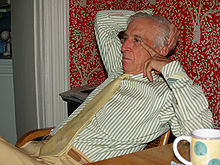Gay Talese
[8] Talese's entry into writing was entirely happenstance and the unintended consequence of his attempt as a high school sophomore to gain more playing time in the baseball team.
[9]: 237 As he recalls in his 1996 memoiristic essay "Origins of a Nonfiction Writer": On the mistaken assumption that relieving the athletic department of its press duties would gain me the gratitude of the coach and get me more playing time, I took the job and even embellished it by using my typing skills to compose my own account of the games rather than merely relaying the information to the newspapers by telephone.
Their pauses, their evasions, their sudden shifts in subject matter are likely indicators of what embarrasses them, or irritates them, or what they regard as too private or imprudent to be disclosed to another person at that particular time.
However, I have also overheard many people discussing candidly with my mother what they had earlier avoided—a reaction that I think had less to do with her inquiring nature or sensitively posed questions than with their gradual acceptance of her as a trustworthy individual in whom they could confide.
During his junior year, he became the sports editor for the campus newspaper, The Crimson White,[11] and started a column he dubbed "Sports Gay-zing",[12] for which he wrote on November 7, 1951: Rhythmic "Sixty Minute Man" emanated from the Supe Store juke box and Larry (The Maestro) Chiodetti beat against the table like mad in keeping time with the jumpy tempo.
[11] Talese had been required (as were all male students at the time owing to the Korean War) to join the Reserve Officers' Training Corps (ROTC) and had relocated to New York awaiting his eventual commission as a second lieutenant.
[17] Finding his mechanical skills lacking, Talese was transferred to the Office of Public Information where he worked for an army newspaper, Inside the Turret (known today as The Gold Standard), and soon had his own column, "Fort Knox Confidential".
As Carol Polsgrove indicates in her history of Esquire during the 1960s, it was the kind of reporting he liked to do best: "just being there, observing, waiting for the climactic moment when the mask would drop and true character would reveal itself.
[22][23] Talese's celebrated Esquire essay about Joe DiMaggio, "The Silent Season of a Hero" – in part a meditation on the transient nature of fame – was also published in 1966.
[26] A number of Talese's Esquire essays were collected into the 1970 book Fame and Obscurity; in its introduction, Talese paid tribute to two writers he admired, citing "an aspiration on my part to somehow bring to reportage the tone that Irwin Shaw and John O'Hara had brought to the short story.
[28] Talese signed a $1.2 million contract with Doubleday in 1972 to write two books, with the first, Thy Neighbor's Wife, due in 1973.
He missed Doubleday's initial deadline and spent 8 years researching the book, including managing massage parlors in New York and running a sex shop.
In a February 2017 interview with Haaretz, Talese said, “This crazy Trump, hustler, real estate tycoon, I think he’s better than Obama.
"[39] In subsequent interviews and on an appearance on Late Night with Seth Meyers, Talese recanted this disavowal, stating that his story was still accurate despite the discrepancies found by the Washington Post.
[40] In a November 2017 interview with Vanity Fair at the New York Public Library's Literary Lions Gala, Talese made comments about the sexual assault accusations against Kevin Spacey that had surfaced over the previous weeks.
Talese stated, "I would like to ask [Spacey] how it feels to lose a lifetime of success and hard work all because of 10 minutes of indiscretion 10 years or more ago.
"[41] The Daily Beast's Tom Sykes wrote "chastising an alleged child sexual harassment victim is a terrible look.

